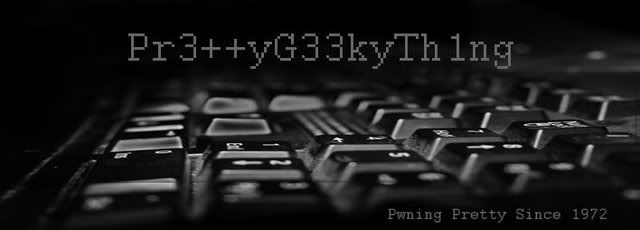 Among the many, many curious psychological issues I have (And I've only scratched the surface here on Pr3++yG33kyTh1ng -- Trust me, if I were just a bit more into self-analysis each post would have the potential to have Dr. Phil phoning his network and frantically trying to get them to loosen up on the profanity moderation while he pushes stacks of cash at me across his desk.) I have some book-related ones.
Among the many, many curious psychological issues I have (And I've only scratched the surface here on Pr3++yG33kyTh1ng -- Trust me, if I were just a bit more into self-analysis each post would have the potential to have Dr. Phil phoning his network and frantically trying to get them to loosen up on the profanity moderation while he pushes stacks of cash at me across his desk.) I have some book-related ones.The mere thought of being "out of book" makes me a little twitchy. There is solid comfort in knowing that if the power goes out, I have, somewhere, book. Being without book mentally throws me into non-stop worst-case disaster scenarios where I try to figure out how to charge my MP3 player in a world without electricity -- because my MP3 player is loaded with audiobooks.
Since most of the country has regular, fairly reliable power, though, I more often just need to replenish the book supply. This is another issue, since what I purchase for myself to read generally doesn't ever make it to the table up front at Barnes and Noble.
I don't read classics. The Great Gatsby cured me of that in two grueling readings.
I haven't been able to intentionally pick up anything which includes an author's unique perspective on The Human Condition since The Great Gatsby reading #2.
I can read technical documentation, but it is generally almost as boring.
I can also read Self-Help books, though I limit them to one per five years to avoid conflict with my moratorium on self-analysis. Actually, the time to select a new one is within the next couple of months. I'm leaning towards this one to help me get over my intense hatred of F. Scott Fitzgerald so I can actually wander around an entire bookstore someday.
However, one per five years leaves a lot of open space in my reading calendar. This open space I choose to fill with . . . filler.
I prefer pulp. I want to read books which don't set out to be good. Books which were written in mass quantities in the first half of the twentieth century and then never looked at again. Laser swords and armored dinosaurs crammed into impossible science with a gritty anti-hero protagonist who dances on the border between two-dimensional and completely un-likable. This is literature by an obvious pay-per-word mercenary author whose whole career may have been based around writing stories to go along with scandalous cover art which was often printed in advance of the actual book.
"I need 5,000 words by the end of the month to go along with the cover art I can't fax you because it is 1933. There is this guy on top of a hill surrounded by other guys trying to kill him."
"What color is the sky and the ground?"
"Red and grey."
"How many arms do the guys have?"
"Two."
"So they aren't Martians. Got it. I'll have it on your desk in a week, Chief. Tell the dame in the front office I said 'hello'."
Mass-produced and forgotten fiction, the bane of book reviewers. These are stories to be read alone with no discussion with other people about what they thought of the central conflict and thematic elements.
Some of the absolute best ones only appeared in magazines with line drawings which were stark and simple -- not as an artistic choice, but because details were lost when printed onto the cheap paper.
Sometimes someone will publish an anthology of the same twenty or thirty of these, slap a generic over on it, and send it directly to the bargain area at Borders. They will include a forward written by the pulp writers of today. These people write stories with dragons and laser swords for Hasbro (featuring the fantasy worlds of the Dungeons and Dragons game) or Lucas Arts Publishing (which fling the story from the Star Wars movies 3000 years into the past or write seven hundred pages about that guy from the cantina scene they edited out entirely in the "Special Edition" release of the movie). I read those books, too.
But the "Classics", to me, were all written before 1960. The details never mattered. The books existed to fill shelf space and they knew it.
The greatest of these authors, in my opinion, was Robert E. Howard. That guy (who influenced and was influenced by H.P. Lovecraft through direct correspondence) wrote some seriously twisted stuff. A vampire hunting Puritan warrior? Really? With shoe buckles and flintlock pistols? If it didn't kick so much ass, it never would have been adapted into a comic book. Or a movie.
They also made a movie about Howard's life, though I've never seen it because I can't imagine how one would transform the story of a man who lived with his mother until he took his own life could be made into a love story of any kind.
But now . . . Now this form of blatant non-art is coming back.
Paizo Publishing picked up the rights to a bunch of pulp fiction work and they are releasing it at a steady rate of one trade paperback a month. No leather-bound, gilt-edged volumes for this stuff, oh no. And the price per book is pretty reasonable, with a discount for subscribing to it. This Planet Stories service is like the "Crap Fiction of the Month Club" and I fully intend to subscribe as soon as I determine when/if the movers will be bringing me bookshelves.







3 comments:
They refused to load up the bookshelves. But, if you buy enough books, we can make a bed out of stacks of them.
Challenge: Accepted
Yet you never read "I Am Legend" ...
I am shocked and saddened by your Philistine sensibilities ...
Post a Comment